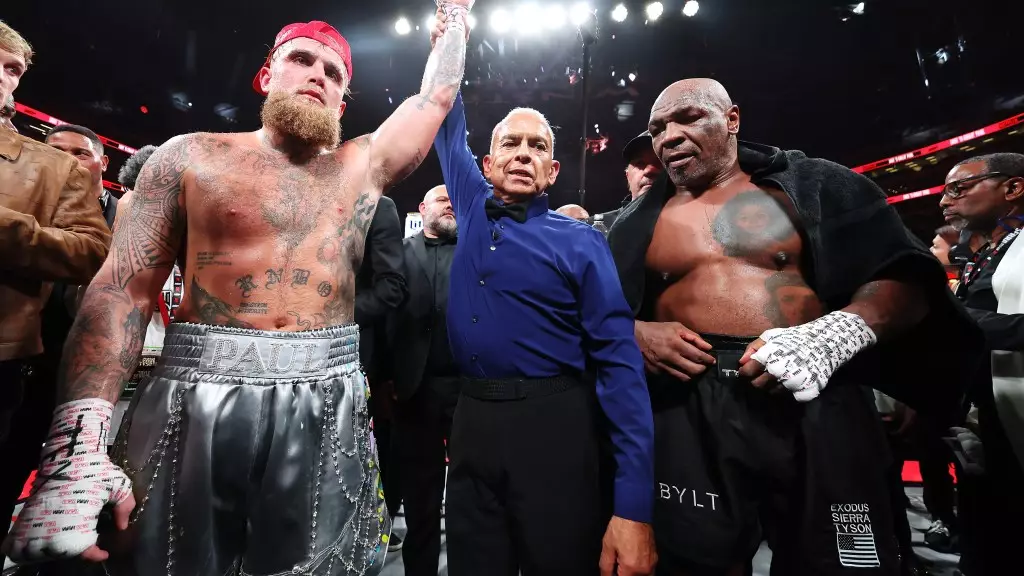In the wake of the recent boxing match between Jake Paul and Mike Tyson, a whirlwind of skepticism and criticism has engulfed the event. While the fight garnered significant attention, breaking viewership records on Netflix and drawing a crowd of over 70,000 in person, it simultaneously opened the floodgates for conspiracy theories alleging the match was scripted. Promoters from MVP (Most Valuable Promotions), co-founded by Paul, have taken a strong stance against these claims, labeling them unfounded and attacking the very essence of these allegations.
The match, which occurred on November 16, was not just an exhibition; it was a professionally sanctioned bout overseen by the Texas Department of Licensing and Regulation (TDLR). It featured an unusual two-minute round duration instead of the standard three minutes, which has further fueled debates over the legitimacy of the event. Despite these atypical attributes, the bout was a major promotional spectacle that attracted significant viewership, stressing the growing intersection between traditional sports and modern entertainment, particularly with figures like Jake Paul at the forefront.
Critics, including notable former boxing champion Oscar De La Hoya, soon accused the fight of being a sham. De La Hoya’s assertion that the event was scripted raised eyebrows and skepticism among boxing purists. Accusations from former athletes and established sports figures often carry weight due to their insider experience; however, their implications can sometimes speak more to personal biases than concrete truths.
MVP responded emphatically to the accusations, disseminating a statement that sought to clarify the nature of the fight and the integrity of both competitors. They asserted that rigging a boxing match is a serious federal crime in the United States, emphasizing the reality that both Paul and Tyson entered the ring with the intent to win unencumbered by covert agreements. This defense not only aimed to preserve the dignity of the individual fighters but also to protect the broader reputation of the sport itself.
Critics of the fight often fail to recognize the immense amount of effort and dedication required to compete at the professional level. MVP articulated that suggesting anything less than full commitment from the athletes is not only misguided but also disrespectful to the hard work inherent in becoming a successful fighter. With both athletes boasting distinct yet impactful careers—Paul, a social media influencer turned boxer, and Tyson, a legendary figure attempting to re-establish his presence—it is understandable why fans and insiders alike would be drawn to narratives of rivalry and competitiveness rather than scripted outcomes.
The financial ramifications of claiming a fixed fight are not trivial. MVP argued that participating in or even contemplating a rigged contest would jeopardize their fledgling relationship with Netflix, which recently expanded into live sports with this bout. Such a partnership is rooted in mutual trust and the belief in fairness—ideas that would be fundamentally questioned if any impropriety were proven. The stakes are extraordinarily high, suggesting that the incentive to maintain integrity outweighs any potential short-term gains from tampering with outcomes.
Additionally, the scale of the event, which reportedly achieved a staggering 108 million live viewers, underscores the business acumen seen in Jake Paul’s promotion strategy. Capitalizing on streaming technology and contemporary entertainment trends, Paul represents a major shift in boxing promotion and popularity, bringing in a younger demographic that traditional boxing may have lost. The success of the event could promote future bouts under the MVP banner, provided its reputation remains intact.
Jake Paul’s journey in boxing is fraught with doubt and scrutiny due to his background. Critics often question how someone with his history could achieve entry into the boxing elite, despite his successes. CEO Nakisa Bidarian of MVP remarked on the persistent skepticism surrounding Paul and framed it as an opportunity rather than a hindrance. For Paul, every challenge seems to reinforce his determination to excel, pushing him to prove detractors wrong through tangible achievements.
The juxtaposition between Paul’s charisma and Tyson’s legendary status draws a unique narrative that ties the old guard of boxing with fresh, modern influencers. This mix not only serves to bolster the sport’s relevance but also opens discussions about evolving perceptions toward athletes who might not fit conventional molds. As boxing transitions into new territories of fame and recognition, the surrounding narratives of integrity versus fraud will likely persist.
While the Jake Paul vs. Mike Tyson bout generated significant controversy, it also highlighted the evolving landscape of boxing, spurred discussions about integrity, and reflected on the public’s perception of modern athletes. In an age where digital platforms reign supreme, how these athletes navigate such scrutiny amidst their successes may well dictate the future of not just their careers, but also the sport itself.

